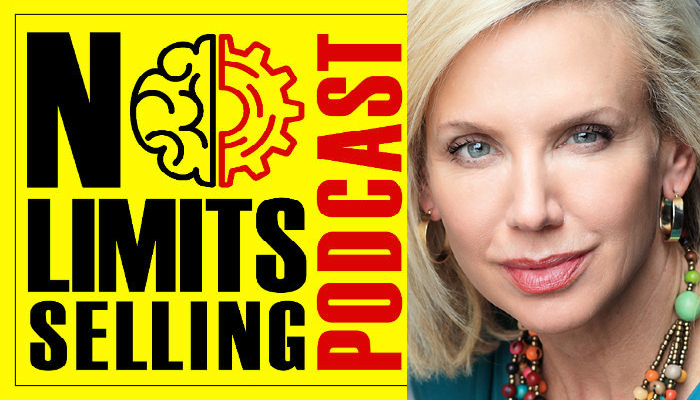Strategic Sacrifice: How To Turn Uncertainty into Opportunity
On Episode 125 of The No Limits Selling Podcast, we have Meridith Elliott Powell, voted one of the Top 15 Business Growth Experts to watch by Currency Fair, a Top Sales Experts To Follow by LinkedIn, and Top 41 Motivational Sales Speakers. Meridith has a cutting-edge message, rooted in real-life examples and real-world knowledge.
She is the author of six books, including “Cut Through The Excuses – Send Sales Through The Roof” , and her latest “Thrive: Strategies To Turn Uncertainty To Competitive Advantage,”
Meridith is regularly featured in publications such as Forbes, Fast Company, Inc., Investment News, and American Banker among others. High energy and highly interactive, Meridith’s helps leaders and business owners learn the new rules of success today, and the strategies they need to build their business, engage their team, and leave their competition in the dust.
Meridith is a Certified Speaker Professional, a designation held by less than twelve percent of professional speakers, as well as a Certified Virtual Presenter, having passed the rigorous certification standards to achieve this designation.
In her highly engaging keynote-speaking sessions, Meridith shows her audiences how to attract more business, retain top talent, and leap into position to win in this new economy. No walking on coals, no breaking boards, just real-life strategies you can put into place first thing Monday morning.
“How she can transform from the stage is amazing; I have hired her multiple times!”
Trish Springfield, SVP, Southern Bank

Contact Meridith:
[EDITOR’S NOTE: This podcast is sponsored by No Limits Selling. It is a fun, fast-paced podcast that delivers hard-fought business advice that you can implement today to improve your sales and performance]
Interested In Our Real Estate Coaching Services? Explore Our Website: Link
Feeling Not Well Today? You Can Use Our Mindset Boosters App To amp Up Your Mood: Link
Find us on Social Media:
LinkedIn | Facebook community | Instagram
Like what do you listen to? Subscribe to our podcast!
Ready to become fearless? We can help you become fearless in 60 days so you accomplish more in your career Schedule A 15 min Call with Umar
Summary
Introduction and Theme of the Podcast
The podcast episode, hosted by Umar Hameed, features Meridith Elliott Powell as a guest. The theme of the podcast revolves around turning uncertainty into a competitive advantage, particularly in the context of the global chaos caused by the COVID-19 pandemic.
Impact of the Pandemic
Both Umar and Meridith discuss the impact of the pandemic on their work. They note that their last in-person engagements were in early March 2020. Meridith shares that her business was significantly affected by the pandemic, with all her engagements disappearing and her income stream drying up.
Transition from Fear to Action
Meridith transitions from fear to anger to action within a week. She attributes this to advice from her mother, Joan, who told her to focus on helping others when facing her own problems. Umar agrees with this approach, sharing an anecdote about how asking for help often leads to positive responses.
Helping Others and Self-Improvement
Meridith emphasizes that focusing on helping others is how one finds the path forward. Ironically, by focusing on helping others, one finds their footing. She mentions that this is a dance that we've had to continue to do, especially during the pandemic.
Facing Financial Difficulties
Umar asks Meridith if she has ever been on the edge of financial oblivion. Meridith admits that she has been broke but has always managed to find another job. She shares a story about dropping out of college and having to support herself, which was a challenge she wasn't initially prepared for.
Dealing with Negative Emotions
Meridith discusses the importance of acknowledging and releasing negative emotions. She suggests that when you feel wronged, you should allow yourself to feel that emotion, then release it. This prevents you from spending the rest of the day looking for things to validate your negative feelings. She observes that we live in a world where people often find opportunities to validate their anger throughout the day, which she feels is more prevalent now than it was five years ago.
Conclusion
The podcast episode on the No Limits Selling Podcast, featuring Meridith Elliott Powell and hosted by Umar Hameed, delves into the theme of transforming uncertainty into a competitive advantage. The discussion highlights the impact of the COVID-19 pandemic on their professional lives, with Meridith sharing her journey from fear to action, inspired by her mother's advice to focus on helping others in times of personal crisis. This approach not only aids others but also helps the individual find their footing amidst chaos.
The conversation also touches on financial struggles and the importance of resilience, with Meridith's personal experiences underscoring these points. Lastly, the podcast emphasizes the significance of acknowledging and releasing negative emotions, suggesting that holding onto anger and seeking validation for it can create a cycle of negativity. The episode serves as a testament to the power of resilience, empathy, and emotional intelligence in navigating uncertain times.
Questions & Answers
What is the main theme of the No Limits Selling Podcast featuring Meridith Elliott Powell?
How did the COVID-19 pandemic impact Meridith Elliott Powell's work?
What advice did Meridith Elliott Powell's mother give her that helped her navigate through the pandemic?
What is Meridith Elliott Powell's approach to dealing with negative emotions?
How did Meridith Elliott Powell handle financial difficulties?
What is the key takeaway from the No Limits Selling Podcast featuring Meridith Elliott Powell?
Don’t miss this opportunity to transform your real estate career with one-on-one coaching. As an experienced real estate coach, I, Umar Hameed, am dedicated to helping you unlock your full potential and achieve your real estate goals. To learn more about who am I and my clients ↓
If you’re ready to take the next step, book an appointment with me today and begin your journey toward success in the real estate industry.
